A Report on 2024 - UAE Global Convention

 |
 |
The Institute of Directors (IOD), India organised its Tristar 2024 UAE Global Convention on 'Leadership for Innovation and Business Excellence' on March 05 – 08, 2024. The venue of the Convention was Hotel Grand Hyatt, Corniche, Abu Dhabi (UAE).
The theme of this year's Convention was, 'Board's Strategy for a Future-Ready Business in an Uncertain World'. The famed Golden Peacock Awards, instituted in 1991 by the Institute of Directors, India for Innovative Product/Service', 'Quality', 'Business Excellence' and 'Training' were also presented to the winners amongst business and industry at the Golden Peacock Awards Presentation Ceremony, held on March 05, 2024. The Convention was attended by around 400 experts, prominent industrial leaders & well-known speakers from India and around the world. Delegates from as many as 15 countries attended the event, including the UK, the USA, Saudi Arabia, Spain, Singapore, Montenegro, Malaysia, Finland, Japan, Philippines, Nigeria, Poland, and Nepal, besides India and the UAE. A large number of prominent members of the Indian diaspora in UAE were present, and participated in the Global Business Meet.
DAY 1, MARCH 05, 2024
Hotel Grand Hyatt, Corniche, Abu Dhabi (UAE)
PLENARY SESSION I:
Opening Session
The 'Welcome Address' was delivered by Mr. Ashok Kapur, IAS (Retd.) Director General, Institute of Directors (IOD). He welcomed all guests, and participants, especially, Mr. Eugene Mayne, Founder and Group Chief Executive Officer, Tristar Group and the Title Partner for the event. He mentioned that the theme of the convention had been chosen to promote the UN Sustainable Development Goals, to which India is a signatory. He also welcomed Dr. Krishna Prasad Chigurupati, Chairman & Managing Director, Granules India Ltd., Mr. Mohit Burman, Chairman, Dabur India Ltd, Mr. Mohit Ralhan, Chief Executive Officer, TIW Capital, Singapore, Mr. Vijay Karia, Chairman and Managing Director, Ravin Group of Companies, India. Mr. Chigurupati, Mr. Burman, and Mr. Karia had flown in all the way from India to participate in the event. Mr. Ralhan had flown in from Singapore.
This was followed by the 'President's Address', delivered by Lt. Gen Surinder Nath, PVSM, AVSM (Retd.), President, Institute of Directors, India. He welcomed all the guests st and dignitaries to the 31 Annual World Congress. At the outset, he said, “The global concern for economic growth in turbulent times calls for strict corporate governance norms, appropriate handling of geopolitical situations and thereby managing the supply chains in the new paradigm. In our interconnected world, every country and every company have to be concerned about how well prepared they are and what new changes in strategy and business models will make them future - ready organisations”. He spoke about creativity and innovation, the technological revolution, emerging trends in corporate governance, globalisation, and diversity.
This was followed by the 'Keynote Address' delivered by:
1. Dr. Krishna Prasad Chigurupati
Chairman & Managing Director, Granules India Ltd.
2. Mr. Eugene Mayne
Founder and Group Chief Executive Officer, Tristar Group, UAE
3. Mr. Mohit Burman
Chairman, Dabur India Ltd.
4. Mr. Raghav Agrawal
Chief Executive Officer, Dabur International Ltd.
5. Mr. Mohit Ralhan
Chief Executive Officer, TIW Capital, Singapore
Dr. Chigurupati spoke about the importance of environmental sustainability and Granules India's commitment to a green future. He said, “In an era defined by rapid technological advancements, geopolitical shifts, and unprecedented challenges—from pandemics to climate change—uncertainty has become our constant companion”. He discussed four key areas for businesses to focus on and prepare for the future, i.e., agility and innovation, people and talent, technology and data, and sustainability. He explained the degree of the carbon footprints of the pharmaceutical industry in India and the initiatives undertaken by Granules to decarbonise. He spoke about the three pillars on which decarbonisation is based, which include green molecules based on green power, water, and air, an efficient method of synthesis based on biocatalysis and flow technology, and breakthroughs in formulation manufacturing avoiding solvents, polymers and reducing water usage.
Mr. Mayne spoke about future-proofing business against uncertainties and a board's key role in pushing this strategy. He said that a future-ready board has to be socially conscious, risk-responsible, digitally literate, embody the concepts of DEI, and uphold the principles of ESG. It must demonstrate a proper balance between immediate shareholder expectations and long-term stakeholder values. He listed four essentials that can strengthen Board of Directors: broaden its scope, rethink its composition, embrace inclusion and diversity, and focus on technology and cyber-security. He added that every company should take advantage of the democratised access to AI—to take the initiative, build the infrastructure, and activate its potential as fast as possible. He explained, “Marathon runners don't dwell on the end of the race, they focus on getting around the next corner”. He concluded by posing a challenging question to the audience, 'What is the smallest step we can take today to make some progress tomorrow?’
Mr. Burman traced the growth and evolution of Dabur India Ltd. He said that Dabur was founded in 1884 in India, and over the last 140 years, it has been dedicated to the health and well-being of every household not just in India but across the world. He said that his company chose the UAE as its international headquarters 38 years ago because of its favourable economic environment, business friendly policies, strategic location, and easy connectivity to global markets. Today, his company not only enjoys a strong leadership position in the UAE, GCC & Middle East, and North Africa, but also in many other international markets such as the USA, UK, Europe, South Asia, and Australia.
Mr. Agrawal said that Dabur has emerged as one of the Indian-originating consumer goods companies focused on healthcare, natural care, beauty care, and self-care. He mentioned that Dabur was awarded the Golden Peacock Award for Quality in 2022. He shared three key insights for any organisation aspiring to be future-ready. First, they need to be focused on their vision, consistently and persistently; second; they must always continue to invest in and nurture their people; and third, they must contribute to creating a sustainable business model.
Mr. Ralhan spoke on the emerging strength of the Asian economy. He said that the advent of ‘machine learning’ and 'artificial intelligence' on the technological front, the growing transition of power from the West to the East on the economic front, and the unipolarity on the political front are a few of the rarest events that the younger generation is facing today. The world is witnessing multiple macro trends today that are not only the rarest in the history of our planet, but are also transformative for future generations. Fast forward to 2045, he said that we will see Asia having 50% of the world's total GDP. Ten of the top twenty economies in the world will likely be from Asia in 2050. This is likely to result in a massive energy transition. Strides in Asia will result in massive tectonic shifts and changes in the political, economic, and social landscape of the planet. Additionally, industrial revolution 4.0 is bringing massive disruption to our planet. He added that with predictive data, analytics, 'machine learning' and 'artificial intelligence', the human mind is traversing a terrain where no past generation has ever seen. He concluded by saying that ‘The unknown will become one of the greatest challenges tomorrow’.

PLENARY SESSION II:
Inaugural Session
This Session formally opened with the playing of the UAE National Anthem, followed by the Indian National Anthem. Lt. Gen Surinder Nath, PVSM, AVSM (Retd.), President, Institute of Directors heartily welcomed the Patron and Chief Guest, His Highness Sheikh Nahayan bin Mabarak Al Nahayan, as well as the Guest of Honour, H.E. Sunjay Sudhir, IFS, Indian Ambassador to the UAE. He said that India and the UAE are linked closely today by a common desire to build a resilient and modern strategic partnership. The IOD Global Convention intends to provide a platform for the exchange of ideas and sharing of solutions, stimulating creativity and promoting innovation for business excellence and sustainability, and developing market solutions.
This was followed by the 'Keynote Address' delivered by the Patron and Chief Guest:
His Highness shared his insights on leadership and innovation. He said that the UAE strongly believes that anyone who is, or aspires to be, a business leader should seek to be held accountable and should embrace the principles of integrity and transparency. Successful business leaders must understand the business environment. He added, “There is no doubt that current world economic developments have created new opportunities for us in India and the UAE to continue to work together. As the world changes, so must we”. While emphasising innovation, he said that today businesses are dependent on innovation for improvement, and that global businesses particularly depend on communication and transportation systems that link them together. This erudite keynote address was very well received by the large global audience with a standing ovation.
This was followed by the 'Guest of Honour Address' delivered by:
His Excellency Sunjay Sudhir, IFS Ambassador of India to the United Arab Emirates
H.E. Sudhir elaborated on the strengthening relationship between India and the UAE. He said that from the Indian perspective, when we look at our relationships with different countries, the relationship between India and the UAE is perhaps the most transformed relationship. He added that the UAE is the third largest trading partner of India, and India is the second largest trading partner of the UAE transacting about $85 billion worth of bilateral trade. He also highlighted the signing of the framework agreement on the ‘India - Middle East Economic Corridor' which is a very important connectivity initiative. He mentioned the Ahlan Modi event, the Bharat Mart, as well as the temple inauguration by the Indian Prime Minister. He concluded by saying, “As governments, we can only make policies and take initiatives like CEPA, BIT, and the rest. Eventually, it is for the businesses to take advantage”.
This was followed by the Presentation of the Golden Peacock Award for Outstanding Innovative Business Leadership.
The Award was presented to:
Dr. Vivek Lall Chief Executive General Atomics Global Corporation, USA Dr. Lall was the highlight of the convention. He had flown in from the USA for receiving the Golden Peacock Global Award for outstanding Innovative Business Leadership from His Highness. Dr. Lall has been appointed to the Advisory Board of the QUAD Investors Network by the White House very recently. He has also been appointed (through the Pentagon) as the US Technical team member to the NATO STO (Science and Technology Organization). He serves on the International Advisory Group of the US Chamber of Commerce as well as Board of Directors of US Japan Business Council and the Global Board of Directors of the US India Business Council in Washington DC.
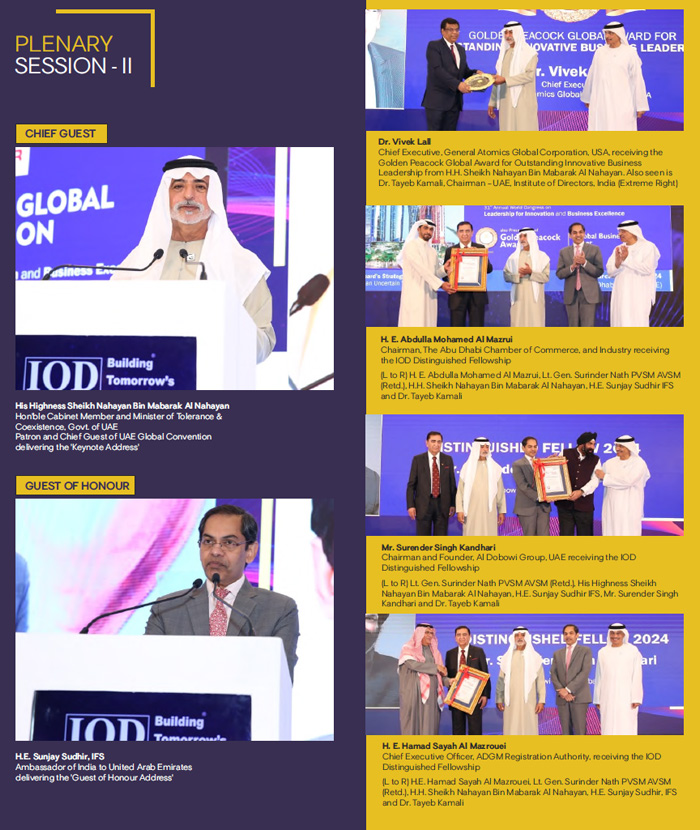
This was followed by the Presentation of the Distinguished Fellowship
The Distinguished Fellowship Awards were presented to:
1. His Excellency Abdulla Mohamed Al Mazrui
Chairman, Abu Dhabi Chamber,
2. Dr. Surender Singh Kandhari
Chairman, Al Dobowi Group, Dubai, UAE
3. His Excellency Hamad Sayah Al Mazrouei
Chief Executive Officer, ADGM Registration Authority, UAE
This was followed by the Presentation of Golden Peacock Awards for 'Business Excellence', 'Quality', 'Training' & 'Innovative Product / Service' - 2024 by the Chief Guest.
PLENARY SESSION – III:
Leadership in Dynamic Times: Capabilities and Business Model Innovation
The Session was moderated by:
Mr. Mohit Ralhan
Chief Executive Officer, TIW Capital, Singapore
Distinguished Speakers of the Session were:
1. Ms. Harshbeena Zaveri
Vice Chairman & Managing Director, NRB Bearings Limited, India
2. Dr. Surender Singh Kandhari
Chairman, Al Dobowi Group, Dubai, UAE
3. Mr. Vijay Karia
Chairman and Managing Director, Ravin Group of Companies, India
Mr. Ralhan began his speech by quoting the world renowned author of 'Future Shock', Mr. Alvin Toffler: 'The rate of change, of change itself is accelerating at a very rapid pace'. He shared a few examples of modern corporate failures where companies could not survive. He traced historical angles of the survival of companies and their relationship with inflation, geopolitics, and other factors. He mentioned that after a few years, businesses today will deal with supply shocks due to Artificial Intelligence. He also highlighted the importance of net zero and sustainability. He said that the planet has witnessed five mass extinctions to date, and each time the most dominant species did not survive. He went on to add that it is not the first player who makes maximum revenue, but the next one because he learns from experience. He concluded by saying, 'We have to make sure that we change faster than technology does'.
Ms. Zaveri spoke about her company, NRB Bearings, and traced its evolution and growth. She said that in the 1990s, the global competition for bearings was primarily German companies, which used to enjoy a software edge. However, with effective leadership and using three important elements, her company was able to compete with these European companies as well. These three advantages are: the effective Indian IT industry; a desire to learn from customers; and developing their own new technology. Drawing from her rich experience, she said, “If you want to achieve something, don't try to convince anybody around you; start small and do something impactful." She also recommended directors to surround themselves with the right mentors and actively take feedback from customers.
Dr. Kandhari spoke about effective leadership. He said that effective leadership requires the ability to anticipate shifts, adapt to emerging trends, and inspire teams to navigate uncertainty with resilience and agility. He added that it is understanding the importance of fostering innovation and encouraging continuous improvement to stay ahead in the marketplace. Innovation is not about creating new products and services; it is about reimagining our business models and processes to better serve the needs of our customers and stakeholders. As leaders, we must encourage the capabilities of the workforce. He spoke about the unsung heroes in business, including drivers and office boys, and highlighted their role in helping businesses. In conclusion, he said that navigating dynamic times requires visionary leadership, strategic foresight, and innovation. At the same time, it is important for every business to be holistic. He ended by saying, 'Earn money the right way'.
Mr. Karia emphasised the concept of forward thinking for directors and business leaders. He said that directors must think about the next 5 years and focus on how they can move ahead, thus paving the way for the organisation’s growth. He shared two key words: Resilience, and Resistance. He said, many times, because of various reasons, the board resists change. But as directors, what is required is resilience and sustainability.
This Session was followed by an interactive Q&A Session with the Audience.
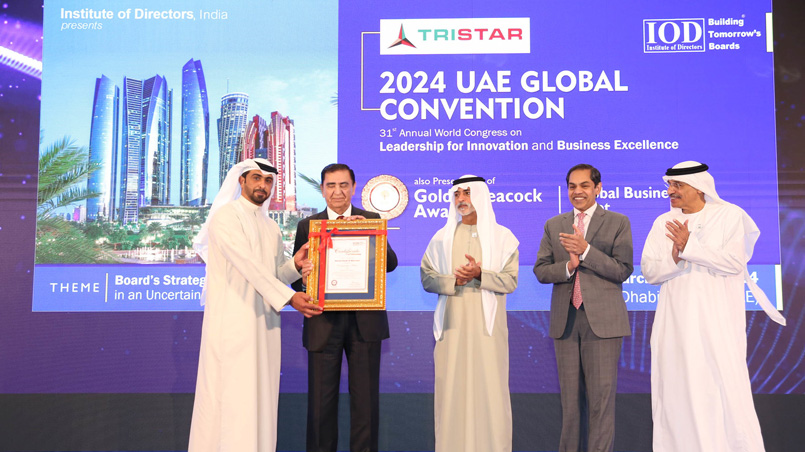
PLENARY SESSION – IV:
Driving Growth and Innovation in the Boardroom
The Session was Chaired by:
Mr. KVN Chakradhar Babu, IAS
Joint Managing Director, Transmission Corporation of Andhra Pradesh Ltd.,
India (APTRANSCO)
Distinguished Speakers of the Session were:
1. Mr. Amit Jain
Global Chief Executive Officer, Sterling & Wilson Renewable Energy Group, UAE
2. Dr. Anuj Kacker
Chief Executive Officer, Aptech Limited, India
3. Mr. S. Nataraj
Senior AVP, SWELECT Energy Systems Ltd., India
Mr. Babu outlined the growth of the Transmission Corporation of Andhra Pradesh Ltd., India (APTRANSCO). He said that APTRANSCO schedules energy for the entire state of Andhra Pradesh, with 40% of energy being generated from renewables. He mentioned that APTRANSCO is a lean organisation with around 3,000 employees. He explained a number of solutions prepared by the engineers at APTRANSCO. Highlighting the achievements, he said that APTRANSCO has 99.85% transmission ability, which is the highest in the country. He said that the primary goal of forecasting is not to predict the future but to know what to do today. Drawing from his rich experience in the energy sector, he assured that 100% renewable energy is possible and a commitment to net zero is attainable.
Mr. Jain spoke about Sterling & Wilson Renewable Energy Group. He shared that they are a leading Engineering, Procurement, and Construction (EPC) solutions provider in the world. Their Group takes pride in being one of the very few Indian companies with renewable energy portfolios on all six continents. He went on to share his insights on boardrooms. He said that in our fast-changing environment, a boardroom has a much broader role than just governance. He added that boardrooms have become centres of innovation, discussion forums for strategic planning, and a driving force for company growth. He mentioned that cultivating an 'experimental' culture in boardrooms is crucial. He went on to discuss the importance of 'technology' and 'machine learning'. He said that boards today need to combine technology with market potential. He highlighted the use of machine learning and artificial intelligence in the functioning of renewable energy facilities. He concluded by saying that the boardroom is where cyber security strategy meets business strategy, and ignoring one puts the other at risk.
Dr. Kacker explained what it really means to be part of a board. He said that even though disruption is not new, the present is different, as it is a dramatic change, both in the rate of change, as well as the increased amplitude of both risk and opportunity, that merits board consideration. He also said that the disruption brought in by AI beats all other technological disruptions of the past. He gave an example of a UAE-based company that added an AIbased virtual observer to their board, for the purpose of advising the other board members, thus signalling that the board had initiated disruption to their own process. He urged the boardroom community to change the narrative and bring in the new generation to the boardroom for further thrust on the effective use of technology. He concluded by saying, “How many of us would really say to ourselves - how I can drive change? – Once we are able to do that, change will begin to happen".
Mr. Nataraj traced the growth and evolution of Aptech Limited. He said that the energy sector contributes to maximum greenhouse gas emissions compared to all other sectors, which is why their organisation is focused on finding how solar energy can mitigate climate change. He explained some of the green technologies utilized by Aptech Ltd., such as on-shore wind energies and solar photovoltaic systems.
This was followed by an interactive Q&A Session with the Audience.
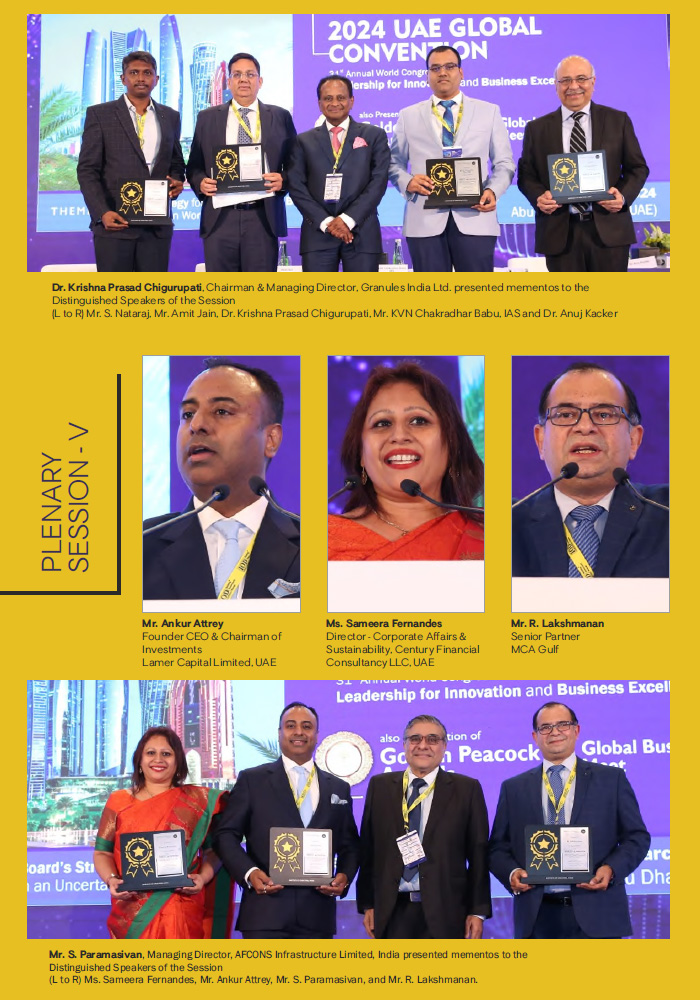
PLENARY SESSION – V:
Emerging Challenges for Boards in the New World Economy
The Chair of the Session was:
Mr. Ankur Attrey
Founder CEO & Chairman of Investments, Lamer Capital Limited, UAE
Distinguished Speakers of the Session were:
1. Ms. Sameera Fernandes
Director - Corporate Affairs & Sustainability, Century Financial Consultancy LLC, UAE
2. Mr. R. Lakshmanan
Senior Partner, MCA Gulf
Mr. Attrey set the context of the session in the light of asset management. He spoke about the responsibilities and functions of asset managers. He said that Lamer Capital Limited provides the best financial solutions to investors irrespective of market dynamics. He declared that adjusted risk returns through strategies are what an investor eventually aims for. He opened the floor to further discussions on the theme of the session, 'Emerging Challenges for Boards in the New World Economy'.
Ms. Fernandes spoke on 'Boards Reimagined'. She discussed a study by the Corporate Governance Institute that indicated that there is a 6% increase in the performance of a company if it has a board with strong leadership skills, a 33% increase if a board has diversity and women, and a 38% increase in performance if a boardroom has technology as a skill set. She emphasised the concept of how boards should lead 'intentionally', i.e., by committing to a business with a bigger purpose in life. She gave four strategic priorities for a board, which include agility, stakeholder engagement, sustainability and ESG, and talent and diversity. She said that the future of boards would be adaptive, inclusive, ESG-based, and have a healthy learning culture. She also mentioned a few pain points of current boards, such as a lack of diversity and insufficient utilisation of technology.
Mr. Lakshmanan spoke on ‘Boardroom Challenges’. He said that directors need to be careful about geopolitical risks. He discussed the issue of technology and said that being abreast of the latest updates is necessary to stay ahead in the game. He also emphasised the importance of human talent and highlighted challenges such as acquiring and retaining 'human capital'. He also spoke about sustainability and ESG and recommended that all directors follow reporting and climate regulations. He said that for each challenge, there are various advisory services that directors can use to help grow their company. He said, 'traditional business models are not going to sustain'. In this light, he suggested that if a company is well established and has been working for a long time, they should also add younger generations to the board and explore new ways of doing business to become future-proof.
This was followed by an interactive Q&A Session with the Audience.
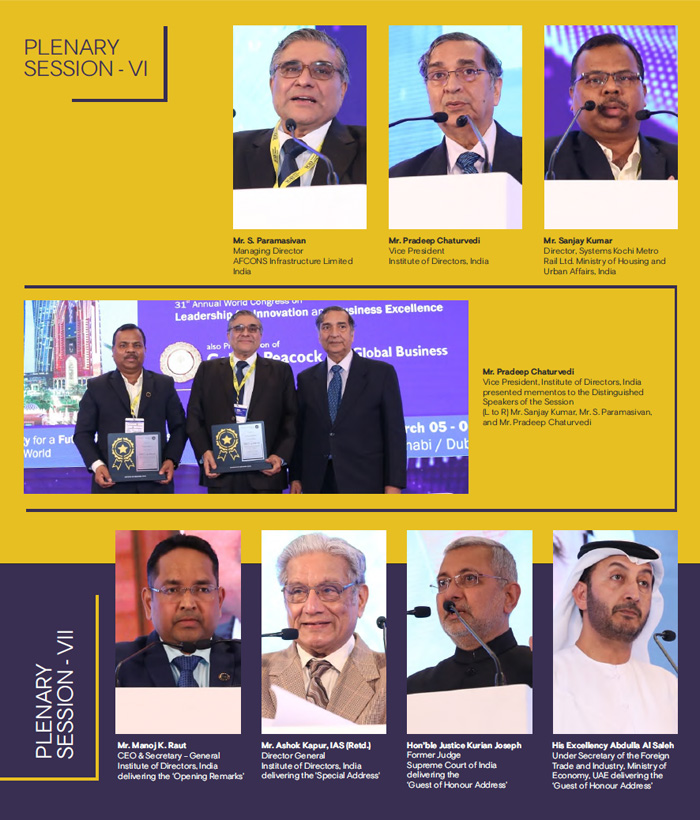
PLENARY SESSION – VI:
Deciphering New Sustainable & Inclusive Growth Models
1. Mr. S. Paramasivan
Managing Director, AFCONS Infrastructure Limited, India
2. Mr. Pradeep Chaturvedi
Vice President, Institute of Directors, India
3. Mr. Sanjay Kumar
Director, Systems, Kochi Metro Rail Ltd.
Ministry of Housing and Urban Affairs, India
Mr. Paramasivan spoke about sustainable and inclusive growth models for construction companies. He said that key elements of such models include the use of ecofriendly or recycled construction material, energy efficiency, fair labour practices, local community engagement, diversity and inclusion, and compliance with applicable regulations, among others. While emphasising on the issue of reconciling growth with sustainability and social impact, he said that ESG principles not only reinforce conventional growth models for construction companies but also facilitate growth in other ways. He also laid emphasis on the role of technology and the impact of Industry 4.0 saying that technological advancements today offer unprecedented opportunities for operational efficiency and sustainability. With regard to the role of board directors, he said that it is imperative for boards to set clear ESG goals, seamlessly integrating them into the company's strategic roadmap. This strategic alignment ensures that sustainability and inclusivity are not mere afterthoughts but integral components of the organization's mission and vision. He ended by saying, “Let us seize this opportunity to build a future where growth is not just measured by financial metrics but by the legacy we leave for generations to come”.
Mr. Chaturvedi spoke about sustainability and the whole concept surrounding it. He said that most senior executives of companies are keen on taking on sustainability initiatives immediately, but boards are taking time because they feel financial investments will not bring returns quickly enough. While referring to the Davos Global Meeting, he concluded that speed is crucial to outperforming competitors. He said that, compared with their peers in slow-moving companies, leaders and fast-moving organisations report 2.1 times higher operational resilience. He also added that sustainability should be seen as a business imperative. He said that 'will, skill, rigour, and scope' combined can give leaders a better chance to outpace the competition at this time of consistent disruption and change. He also spoke about how geopolitical risks need to be built into sustainability aspects. He also highlighted the importance of ethical leadership and explained that talented employees do not stay in companies where there is no ethical leadership. In conclusion, he said that the ‘valuation’ of a company is not as important as the ‘values’ of the company.
Mr. Kumar spoke on the topic of 'deciphering new models for sustainable and inclusive growth'. He said that businesses need to run on models that balance economic prosperity with the environment and social well-being. He added that existing working models are contributing to pollution and social inequalities. He gave real-life, practical examples from his organisation that commissioned a sustainable mode of transportation, i.e., the 'water metro' in India. While recounting the various policies and benefits of the water metro, he shared that the business model was transparent, included energy audits, reduced demand, was inclusive by employing transgender people, was affordable for students, and also included EPMC, i.e., Electronic Project Management Consultancy. He went on to describe the many benefits of the water metro, such as reducing inequalities, improving health and well-being, greater social cohesion, and resource efficiency.
This was followed by an interactive Q&A Session with the Audience.
This was followed by a ‘Special Presentation’ made by:
Ms. Mala Roy
Managing Director , Thermogreen Cool Coat Pvt. Ltd., India
Ms. Roy presented a detailed and instructive video of the remarkable success of her company's product and its many benefits in terms of environmental and resource efficiency. Thermacool Coating is an outdoor coating system, especially for roof tops of concrete, or steel, applied to reflect solar heat, thus bringing down the roof temperature by 15-20˚C depending on hot summers, thereby resulting in a drop in indoor ambient temperature of about 4–8˚C. She said that the technology was developed by her and is now available to be shared profitably with the world.
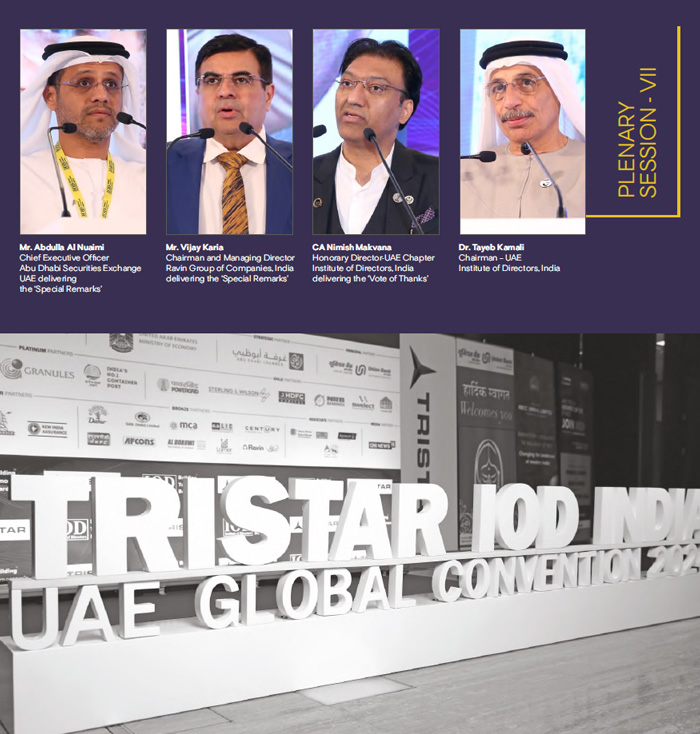
PLENARY SESSION – VII:
Global Business Meet
Expanding Trade and Investment Opportunities
The 'Opening Remarks' were proposed by:
Mr. Manoj K. Raut
CEO & Secretary – General, Institute of Directors, India
Mr. Raut spoke about the importance of networking, collaborating, and building partnerships. He said, 'Businesses are like building collaborations; one can't run any business without a partnership'. He traced the evolution of the Institute of Directors, India, its growth journey, and mentioned that today, IOD caters to a director's network of $4 trillion in the equity market. He said that the training and networking of directors are IOD's main strengths. He extended special gratitude to His Highness Sheikh Nahayan bin Mabarak Al Nahayan for his blessings on IOD over the last so many years. He further added that there is a lot for businesses to learn from one another, and that is why such business conferences that IOD conducts globally and nationally have become all the more important. He said that India is growing at its fastest pace, and both the governments of India and the UAE are also taking several measures to further ties at all levels. He concluded by saying, “Building a strategy is very important while aligning our business and talent to the changing global market environment.”
The 'Special Address' was delivered by:
Dr. Ronald Colaco
Founder and Chairman, Clarks Exotica, India
In his absence, read by:
Mr. Ashok Kapur, IAS (Retd.)
Director General, Institute of Directors, India
Mr. Kapur introduced the theme of the event by emphasising innovation. He said that pioneering companies today, prioritise and emphasise years of organisation performance and are uniquely in a position to inspire and enhance all - round innovation because innovation is central to core values and creative leadership. He also emphasised on the concept of Business Excellence and said that it is not just about short term profits, but about creating a culture of continuous improvement, innovation and customer focus. He again welcomed all the special guests, in particular, he thanked the Guests of Honour.
The 'Guest of Honour Address' was delivered by:
1. Hon'ble Justice Kurian Joseph
Former Judge, Supreme Court of India
2. His Excellency Abdulla Al Saleh
Under Secretary of the Foreign Trade and Industry, Ministry of Economy, Govt. of UAE
Hon'ble Justice Joseph spoke about 'alternative dispute mechanisms', drawing from his vast experience in dispute resolution as prevalent in India, and urged companies to avoid lengthy and expensive litigation at any cost. He said that the first and most common dispute resolution mechanism is litigation. The second mechanism is mediation, which one can avail of during litigation as well. He explained the concept of Mediation and said that it involves an independent, neutral person hearing both sides and coming to a consensus. The third mechanism he explained was Arbitration, and he expressed that even the UAE recognizes Arbitration as a valid form of business dispute resolution. He explained the process of Arbitration and then went on to explain the fourth resolution mechanism, i.e., mediated arbitration. He mentioned that judicial tribunals have a duty to encourage settlement between parties. He gave real-life examples of settlement procedures and listed the benefits of seeking 'alternative dispute resolutions'.
H.E. Al Saleh discussed the historical evolution of economic thought and its influence on the governance of companies, government institutions, public benefit and non-profit organisations. He said that as we navigate the complexities of a globalized economy, the integrity of both formal and informal institutions, as well as the private sector, is of paramount importance in shaping policies that drive economic development. He emphasised the importance of good governance and added that transparent and accountable governance structures build trust among investors, both domestic and foreign, fostering an atmosphere that encourages long-term investments and entrepreneurship. He inspired the distinguished audience and said, “As leaders in the realm of governance and management, it is incumbent upon us to champion the values of integrity, transparency, and accountability”. His special address was well received by the global audience with a standing ovation.
The ‘Special Remarks’ were made by:
1. Mr. Abdulla Al Nuaimi
Chief Executive Officer, Abu Dhabi Securities Exchange, UAE
2. Mr. Vijay Karia
Chairman and Managing Director, Ravin Group of Companies, India
Mr. Al Nuaimi spoke about the strengthening ties of India and the UAE, as well as the growth of the Abu Dhabi Exchange (ADX). He said that ADX continues to play an instrumental role, enforcing the strong bilateral ties with India to facilitate mutual beneficiary market access which contributes to UAEs capital market.
Mr. Karia spoke about leadership for future-ready organisations. He redefined VUCA as Vicious, Unpleasant, Cruel and Aggressive, but also assured that businesses can realign the political world, as well as recalibrate themselves to work in an environment that they themselves make conducive to bigger and better things. He said that leaders should adapt to the eight A’s which are: Agility, Adaptability, Ability, Accessibility, Accountability, Availability, Acceptability, and Affordability. He also explained how leadership must be generous, resilient, orderly, warm and welcoming. Therefore, the acronym for this generosity, resilience, orderliness, and warmth is ‘GROW’. He concluded by saying, “We should keep on learning, we should keep on growing, and I think we should keep on meeting. The last few years have prevented a lot of interaction, especially human interaction. I think meetings like this help all of us to become better, to create new relationships, and most importantly, to grow”.
The ‘Vote of Thanks’ was proposed by:
CA Nimish Makvana
Honorary Director - UAE Chapter, Institute of Directors, India
CA Makvana specially thanked the Patron & Chief Guest of the convention, His Highness Sheikh Nahayan Bin Mabarak Al Nahayan, Hon’ble Cabinet Member and Minister of Tolerance & Coexistence, Govt. of UAE, for his blessings. He also extended his thanks to the great ruler of UAE, His Highness Mohammed bin Rashid Al Maktoum, for welcoming so many leaders to the land of opportunities. He thanked the Guest of Honour, H.E. Sunjay Sudhir, IFS, Ambassador of India to the United Arab Emirates. He thanked distinguished guests and various award winners, Dr. Vivek Lall, Chief Executive, General Atomics Global Corporation, San Diego, USA; H. E. Abdulla Mohamed Al Mazrui, Chairman, Abu Dhabi Chamber, UAE; Dr. Surender Singh Kandhari, Chairman, Al Dobowi Group, Dubai, UAE; H.E. Hamad Sayah Al Mazrouei, Chief Executive Officer, ADGM Registration Authority. He especially thanked H. E. Abdulla Al Saleh, Under Secretary of the Foreign Trade and Industry, Ministry of Economy, UAE who had specially come corm Dubai for his strong and continued support to the IOD. He thanked Hon’ble Justice Kurian Joseph, former Judge, Supreme Court of India for his gracious presence. He thanked Mr. Vijay Karia, Chairman and Managing Director, Ravin Group of Companies, India who had flown in from India for his valuable support and presence, as well as Mr. Eugene Mayne, Founder & Group CEO, Tristar Group, UAE. He also thanked Dr. Tayeb Kamali, Chairman, Board of Trustees, Abu Dhabi School of Management for all his support. He finally thanked the leadership of the Institute of Directors, Lt. Gen Surinder Nath, PVSM, AVSM (Retd.). Mr. Pradeep Chaturvedi, Mr. Ashok Kapur IAS (Retd.), and Mr. Manoj K. Raut for arranging this Global Convention.
‘Special Remarks’ were presented by Dr. Tayeb Kamali, Chairman – UAE, Institute of Directors, India Dr. Kamali thanked everyone for attending the conference and coming together. He said it is truly remarkable how we all feel like we are one big family. He said that the 2024 conference is special as it is the first time that IOD hosted a conference in Abu Dhabi. He finally thanked everyone who had played a major role in making the event a success.
DAY 2, MARCH 06, 2024
Hotel Grand Hyatt, Corniche, Abu Dhabi (UAE)
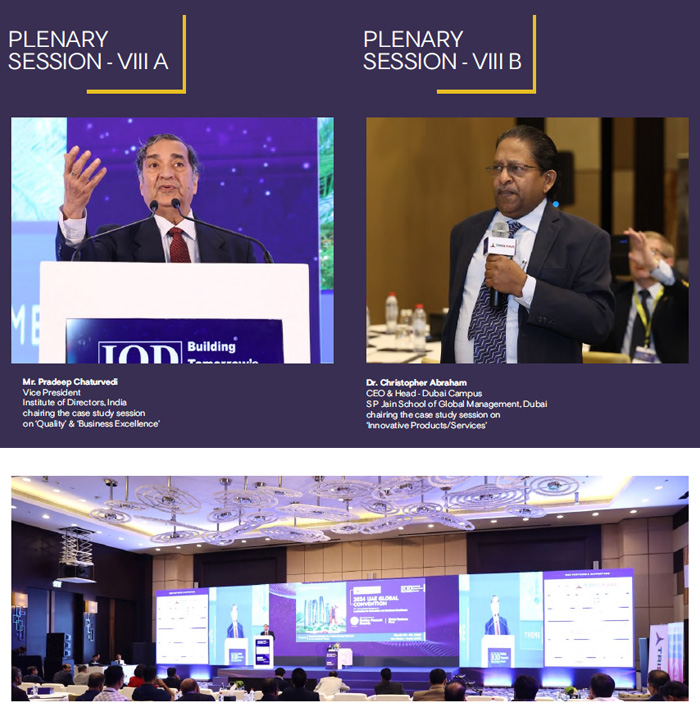
PLENARY SESSION – VIII A:
Golden Peacock Excellence Model
Case Study Presentations
Success Stories on 'Quality' & 'Business Excellence’
The Chair of the Session was:
Mr. Pradeep Chaturvedi
Vice President, Institute of Directors, India
Mr. Chaturvedi spoke about the Golden Peacock Awards instituted in 1992 by IOD. He informed that the Golden Peacock Awards have gradually grown from National and to Global in 16 different corporate verticals. He outlined how, after, around 30 years of the Golden Peacock Awards, it has become a brand. He said that the Award assessment process is very transparent, rigorous, and independent a three-stage exercise handled by well known, and trained professionals. He congratulated all the Award winners for their efforts. He also mentioned the growing number of applications from not just Indian companies, but also UAE companies in light of the increasing number of business collaborations between India and the UAE.
Case Studies in the 'Quality' and 'Business Excellence' Golden Peacock Award categories were made by the below-mentioned companies, which were conferred physically and collected by the winners for the year 2024:
1. Tata Motors Limited
Himadri Mukherjee, Head Quality TMCV
2. Subros Limited
Ravi Mohan Khanna, Senior General Manager - Quality
3. eClerx Services Limited
Samir P. Shah, Lead Quality – Financial Market Vertical
4. JK Lakshmi Cement Limited
Vaibhav Kesharwani, Head of CoE
5. Larsen & Toubro Limited
P. Sivasankaran, Head – Quality Management System
6. Reliance BP Mobility Limited
Surender Addagarla, Head – Fuels Marketing
7. Tristar Transport LLC, UAE
Balaji Nagabhushan, Group Chief Administrative Officer
8. Adani Road Transport Limited
Sanjiv Kaushesh, Head - Business Excellence
Each presentation was followed by an interactive Q&A Session with the Audience.
PLENARY SESSION – VIII B:
Role of Innovation in Progressive Economic Growth
Innovation and Growth in the Global Economy:
Showcasing innovations and cutting-edge technologies.
Success Stories on 'Innovative Product / Service’
The 'Special Address' was delivered by:
Dr. Christopher Abraham
CEO & Head - Dubai Campus, S. P. Jain School of Global Management, Dubai
Dr. Abraham spoke about the importance of innovation in business. He said that we must continuously innovate to stay relevant and thrive. Innovative products and services not only satisfy existing needs but also anticipate future desires. Innovations hold the power to revolutionize markets, improve efficiency, and enhance quality of life. With this, he congratulated all the award winners and invited them to present their case presentations.
Case Studies in the 'Innovative Product / Service' Award category were made by the below-mentioned companies, which were conferred physically and collected by the winners for the year 2024:
1. MG Motor India Private Limited
Om Prakash Bharthuar, Assistant General Manager
2. Pricol Limited
Siddharth Manoharan, Director – Strategy
3. Rossari Biotech Limited
Vanchinathan Sivaswamy, Head Sales (SAARC)
4. Tata Consulting Engineers Limited
Mandar Umakant Padgaonkar, Sr. GM and Head of Delivery for the Digital and Advanced Technology Business
5. Bajaj Electricals Limited
Vinayak Raje, Vertical Head – Consumer Products R&D
6. SBI Life Insurance Company Limited
Sourav Majumder, Deputy Chief Information Officer
7. Oil and Natural Gas Corporation Limited
Suman Sharma, Senior Chemist
8. Tata Power Company Limited
M. Siddiqur Rahman, Chief Projects
9. Transmission Corporation of Andhra
KVN Chakradhar Babu IAS, Joint Managing Director
Each presentation was followed by an interactive Q&A Session.

PLENARY SESSION – IX:
Driving Sustainability through Visionary Leadership, Creativity, and Innovation
The Chair of the Session was:
Mr. Ovais Sarmad
Former Dy. Executive Secretary, UN Climate Change (UNFCCC)
Distinguished Speakers of the Session were:
1. Mr. Balaji Nagabhushan
Group Chief Administrative Officer, Tristar Group, UAE
2. Mr. Sanjay Kumar
Chief Strategy & Sustainability Officer, Granules India Ltd.
3. Mr. Anjan Das
Head of Operations and Supply Chain, Dabur International Ltd.
Mr. Nagabhushan spoke about Tristar's commitment to serving the community, society, and sustainability. He mentioned how Tristar celebrated its Silver Jubilee in 2023, and how they are fully committed to cultivating a culture of innovation. He said that diversity in sectors poses a lot of challenges. However, the solution lies in looking forward and thinking ahead. He also emphasised some of Tristar's sustainability initiatives and strategies.
Mr. Kumar shared his valuable insights on sustainability. He said that it is important to deal with the hard-to-abate sectors, such as the industrial sector, without which we will not be able to achieve the net zero goal. The most consumed materials in the world are cement, steel, plastic, and ammonia. These are responsible for roughly 20% of energy consumption and 25% of carbon emissions. To date, we do not have affordable and feasible alternatives to these materials. He also added that there is not enough biomaterial like manure or other options that could be converted into fertilisers and replace the use of ammonia. Within the pharmaceutical industry, there are a lot of essential building blocks including hydrogen. He shared that common drugs like paracetamol are very carbon intensive and require fossil fuels. Granules is looking at green hydrogen to replace the use of hydrogen in pharmaceuticals. This requires a lot of collaboration across industries and globally. He also said that the transition fuels like blue hydrogen and natural gas will lead to the maturity of some of the hard-to-scale industries and technologies like carbon capture, utilisation, and storage (CCUS).
Mr. Das began by presenting a video about Dabur Limited. He said that Dabur is a 148-year-old company that has evolved drastically. In the last few years, it has become widely spread in India, the Middle East and Africa. He explained a few building blocks and drivers that helped expand the business from being a medicinal brand to an FMCG company. He emphasised the idea of product evolution and said that leaders must customise their products according to customer demands for the new generation. He spoke about the manufacturing plans of Dabur Limited and highlighted that each plant has emission monitoring systems that help them create ambitious targets. He said that it is not just the health of the household but also the health of the planet. He shared that Dabur is constantly working to create carbon mitigation efforts across the product value chain. On the idea of communities, he said that Dabur has created green houses in India and Nepal to cultivate endangered herbs, thus providing livelihood to farmers.
PLENARY SESSION – X:
Building Strategy for Future-Ready Organisations
The Chair of the Session was:
Mr. Srinivasan Sathyamoorthy IA&AS (Retd.)
Advisor - TIW Capital, India
Mr. Sathyamoorthy set the tone for the session by explaining the theme topic. He said that the session would be focused on the future instead of the past. He mentioned that the origin of the word – VUCA (Volatility, Uncertainty, Complexity, and Ambiguity) was coined by the American Army during the Cold War. In light of this, he said that the world is VUCA for TIW Capital every day. He went on to introduce the panellists and began the discussions.
Distinguished Speakers of the Session were:
1. Dr. Keijo Varis
Prof. of Practice, Turku University of Applied Sciences, Finland
2. CS Rupanjana De
Council Member, The Institute of Company Secretaries of India (ICSI)
3. Mr. R. Lakshmanan
Senior Partner, MCA Gulf
Dr. Varis spoke about issues, challenges and opportunities in mitigating climate change. On the concept of reporting, he said that just one method of reporting does not provide all the necessary details. He said, “What we do not tell is as important as what we tell.” On the idea of managing pollution, he said that converting waste into coal is possible in places like Kolkata, and many other parts of India. In Europe, he added that many companies have built purification processes. He even mentioned that the consumption of paper is going down due to electronic solutions.
CS Rupanjana De spoke on the role of corporate boards and company secretaries in good governance practises. She said that the boards must create a resilient and riskaware organisation, providing strategic guidance and foresight. She shared her observation about the paradigm shift that has happened in the last decade, when having an Independent Director on a board was more about compliance in letter than in spirit. She explained what a volatile, uncertain, complex, and ambiguous world it is and the increasing role of boards in this dynamic business landscape. She added that boards need to have a 360° approach, be agile, proactive, and display adaptable leadership. They must foster innovation and encourage a culture of constant learning. Boards must also regularly reassess the strategic landscape. She also emphasised the forward-thinking of board directors. She went on to highlight the role of good governance. In this regard, she also mentioned the largest body of governance professionals in India, the Institute of Company Secretaries of India, which is the only recognised body in India under the aegis of the Ministry of Corporate Affairs. She said that good governance should not be seen as a cost centre but as a profit centre.
Mr. Lakshmanan spoke on leadership and gave his practical insights on making organisations future proof. He said that decision-making is a key aspect of leadership. He said, “We must make calculated decisions; whether it is the right decision or not, is separate." He shared that, according to him, the past is only an indication. What is important is how one looks ahead. He advised well established companies to include the next generation on the board. He concluded by saying, “To make your organisation future proof, you need to have a combination of youth and technology at the board level.”
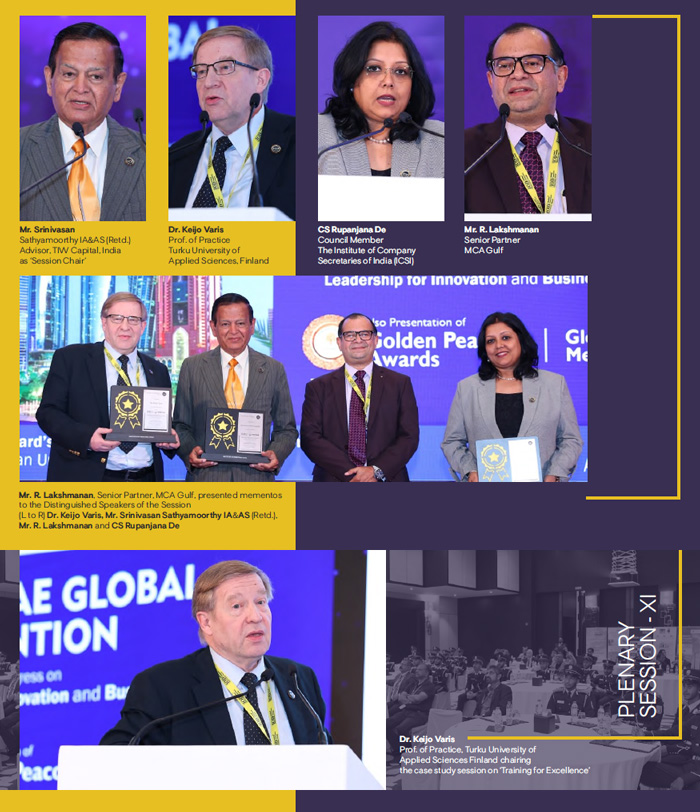
PLENARY SESSION – XI:
Golden Peacock Excellence Model
Case study presentations
Success Stories on 'Training’
The Chair of the Session was:
Dr. Keijo Varis
Prof. of Practice, Turku University of Applied Sciences, Finland
Dr. Varis set the tone of the session, on the theme, 'Training for Excellence'. He shared his vision for India, to be a leader in utilization of solar energy using technology. He introduced the panellists.
Success Stories on 'Training’
Case Studies in the 'Training' Award category were made by the below-mentioned companies, which were conferred physically and collected by the winners for the year 2024:
1. Hindustan Colas Private Limited
Dr. Archana Upadhyay, Chief Human Resource Officer
2. Aptech Limited
Shourya K. Chakravarty, Chief Human Resources Officer
3. Engineering Staff College of India
Dr. G. Rameshwar Rao
4. Cipla Limited
Harpreet Kaur Pannu, Head Sales and marketing Academy
5. Nuclear Power Corporation of India Limited
K. V. Gopidas, Station Director
6. Tata Steel Limited
Chandan Agrawal, Head Training IT & Digital Capability
This was followed by the signing of a Memorandum of Understanding by the Institute of Directors, represented by
Lt. Gen. Surinder Nath, PVSM, AVSM (Retd.), President, Institute of Directors, India and the Abu Dhabi School of Management, represented by Dr. Tayeb Kamali, Chairman, Board of the Trustees.
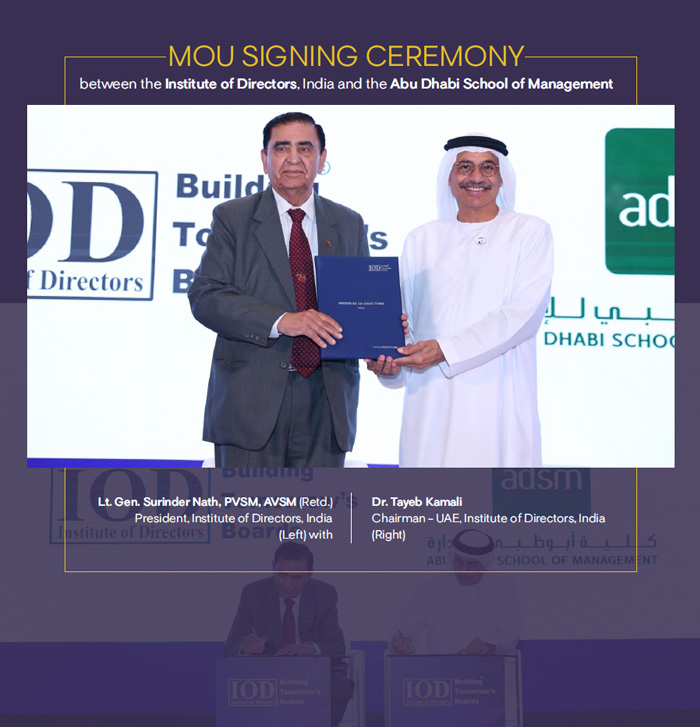
DAY 3, MARCH 07, 2024
CONSULATE GENERAL OF INDIA – DUBAI
After two days of absorbing and stimulating deliberations on Business Excellence and Innovation at the Hotel Grand Hyatt in Abu Dhabi, the venue for (Tristar) IOD UAE Global Convention 2024, shifted to the auditorium of the Indian Consulate in Dubai on March, 7, 2024. This was an ideal setting for the esteemed delegates of the convention to get first-hand insight on the recent India-UAE CEPA, i.e. the FTA and business opportunities. The excitement was palpable as one could notice the auditorium filling up with expectations to explore opportunities in India-UAE bilateral trade and economic relations. This interactive session at the Consulate added another dimension to the (Tristar) IOD UAE Global Convention, transitioning from the traditional B2B set up to the crucial G2B (government to- business) setting. The stage was set for an intense and insightful session on the growing bilateral economic relationship, how the CEPA is changing the landscape of the India-UAE future business association, and most importantly, what it is going to offer to the business and the corporate community in both countries in the future.
SESSION I:
Opening Session
The 'Welcome Address' was delivered by:
Mr. Ashok Kapur IAS (Retd.)
Director General, Institute of Directors
Mr. Kapur set the tone for the day's proceedings with his ‘Welcome Remarks’, for the occasion. He thanked H.E. Satish Kumar Sivan, IFS, Consul General of India in Dubai along with his Consulate officials for hosting the IOD delegation on their premises and curating the whole programme. Mr. Kapur stressed the importance of CEPA, which effectively is a Free Trade Agreement in enhancing business opportunities and its ability to bring businesses closer, which in turn will effect bilateral engagement between India and the UAE. He also traced the rich historical and cultural ties that enabled India and the UAE to seamlessly come up with this complex CEPA agreement, the first of its kind for India.
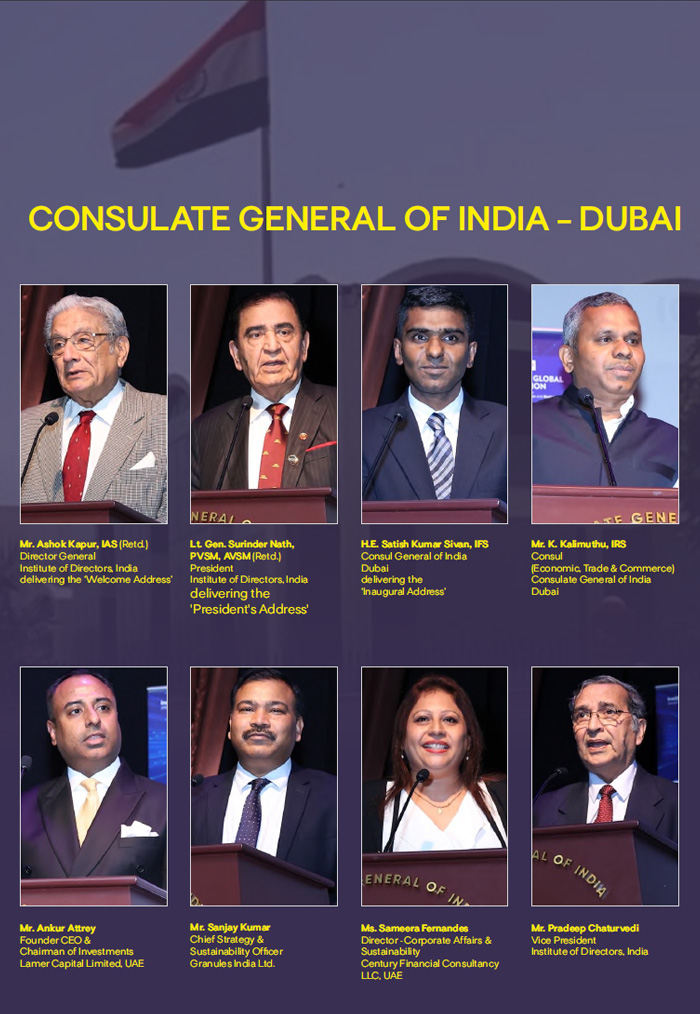
This was followed by the 'President's Address' that was delivered by:
Lt. Gen. Surinder Nath, PVSM, AVSM (Retd.) President, Institute of Directors, India
Ex-Chairman, Union Public Service Commission
Ex-Vice Chief of Army Staff (India)
Lt. Gen. Nath, alluding to the impressive figures that India and the UAE have showcased on the back of the recently signed FTA, pointed out a major area of collaboration that was going to see a lot of traction in the days to come. The financial services sector is set for a major growth trajectory as the recent announcement by the Financial Action Task Force (FATF) has said that the UAE will not be subjected to an increased monitoring process. This announcement by FATF will greatly benefit NBFCs, private equity and Venture Capital funds that are trying to woo investors from the UAE, said the President. Moving further, India's current regulatory norms will be scaled downed further opening up avenues for further investments. One expects in the NBFC sector that the 20% cap on FDI will be done away with and entities in the UAE can now have much larger stakes in the said sector. Referring to the various benefits of the FTA, the President announced that the signing of the FTA has not only transformed the trade landscape between the two countries but has institutionalised India- UAE economic relationship into a long-term win-win partnership for both.
This was followed by the 'Inaugural Address' which was delivered by:
His Excellency Satish Kumar Sivan, IFS
Consul General of India, Dubai
H.E. Sivan spoke about trade and investment opportunities brought forth by the Indo-UAE FTA. He said that India and the UAE share a vibrant, comprehensive strategic partnership, that is broad-based and rooted in strong cultural and people-to-people relationships. He concluded by saying that both the countries remain steadfast in their commitment to leverage these and all possible opportunities for the benefit and growing prosperity of the people of both countries.
SPECIAL SESSION – II
Distinguished Speakers of the Session were:
1. Mr. K. Kalimuthu, IRS
Consul (Economic, Trade and Commerce)
Consulate General of India, Dubai
2. Mr. Ankur Attrey
Founder CEO & Chairman of Investments, Lamer Capital Limited, UAE
3. Mr. Sanjay Kumar
Chief Strategy & Sustainability Officer, Granules India Ltd.
4. Ms. Sameera Fernandes
Director - Corporate Affairs & Sustainability, Century Financial Consultancy LLC, UAE
Mr. Kalimuthu pointed out that the India-UAE FTA has the distinction of being the fastest negotiated FTA in history, showcasing the commitment of both countries towards enhancing bilateral commercial and business ties. Giving an overview of the same, he elaborated that about 80% of the tariff lines from UAE and 65% from India will enjoy benefits of the zero tariff with immediate effect. While the remaining HS Codes and tariff lines will gradually be brought into the fray of zero tariff over a mutually agreed timespan, whose process has already begun. He further remarked about sectors like jewellery and ceramics along with petroleum products, that according to him, have immense potential and opportunity now, courtesy of the FTA. He envisaged that the Textile Sector in India too will get a major boost from this agreement. The terms and agreements of tariff lines have been set out in such a way that the Indian SME sector can expect to get rich dividends in terms of input cost and access to intermediate goods. He also mentioned the Authorised Economic Operator Agreement (AUEOA) between the UAE and India, which has unique provisions, like special status for business entities and companies that make dispensation of compliance procedures faster, among other benefits.
Mr. Attrey emphasised the deep cultural ties between the UAE and India. He felt that it is the culture and the age-old warmth between the two countries that is manifesting into a mutually beneficial trade and growth story. Talking about CEPA, he was of the opinion that the provision for trade services will eventually be a game changer for both countries as both have a sizeable service sector. Some of the other points and topics he touched upon during the course of his address were digital transformation, AI, sustainability and collaboration for innovation.
Mr. Kumar hailed the FTA as a unique success and victory of India's diplomacy and its effort to integrate India with its historical areas of interest and influence. He pointed out that India is actually an extension of the Middle East. According to him, India should look at the UAE and Singapore as its two new borders in the West and East respectively. He presented some interesting facts about how the UAE is India's third largest trading partner along with Saudi Arabia, which is India's fourth important trading partner. In his view, an FTA is not a free trade agreement but a partnership agreement that will integrate the people of the two nations. According to him, the FTA will hugely benefit the labour intensive industries in India. He mentioned sectors like horticulture, farming and food processing, which will gain a lot of traction from the CEPA. For India, the UAE is now an emergency gateway to Europe and Africa, which are emerging as India's leading trade partners.
Ms. Fernandes agreed with Mr. Kumar that the FTA is effectively a partnership agreement rather than just a free trade agreement. Some of the areas where India could gain from it are the energy sector, as India is the biggest supplier of energy, along with food products, which are already abundant in the UAE. She strongly felt that food as a product should be strictly exempted from any kind of tax or duty since it is grown for all of humanity. Some of the suggestions that she provided included exploring the opportunity of a fixed currency regime. She also stated that one must always look at ways to insulate businesses from global volatility through mechanisms like petrodollars. Innovation, AI, and sustainability, according to her, are the key ingredients to making Indias growth faster. In conclusion, Ms. Fernandes felt that inclusion would become the key differentiator in the current global setup.
The 'Concluding Remarks' were delivered by:
Mr. Pradeep Chaturvedi
Vice President - Institute of Directors, India
Mr. Chaturvedi gave the closing remarks, summing up the discussions, during the session and stressed the need to create an ecosystem of sustainability that would take both business and industry forward. Mr. Chaturvedi thanked all the stakeholders, including the guest speakers, the assembled delegates, and most importantly, the Consulate of India in Dubai, for hosting this leg of the IOD UAE Global Convention 2024.
DAY 4, MARCH 08, 2024
KEMPINSKI THE BOULEVARD, DUBAI
Tristar International Women's Day 2024
The fourth day of the 2024 UAE Global Convention on Leadership for Innovation and Business Excellence concluded with a special celebration with some of the distinguished leaders and women achievers on International Women’s Day 2024. IOD members and guests were part of the celebration at the invitation of the event’s Title Partner, Tristar Group, UAE.
The speakers on International Women’s Day highlighted diversity and inclusion, not just in the boardroom but also in other parts of life. The session had a ‘Special Keynote Address’ by Mr. Eugene Mayne, Founder and Group CEO, Tristar Group, UAE, who highlighted how the group had upheld interwoven concepts like equal opportunities, school for girls, female empowerment, financial literacy, work-life balance, and community initiatives, now known as Diversity, Equity, and Inclusivity (DEI).
IOD is especially grateful to its Event Partners of the Convention.
Our Title Partner: TRISTAR Group, UAE
Our Principal Partner: Union Bank of India
Our Platinum Partners:
1. Granules India Limited
2. TIW Capital Group, Singapore
3. The Jawaharlal Nehru Port Authority, Govt. of India
Our Gold Partners:
1. HDFC Capital Advisors Limited, India
2. SWELECT Energy Systems Limited, India
3. NBCC (India) Limited
4. Sterling and Wilson Renewable Energy Limited
5. NRB Bearings Limited, India
6. Power Grid Corporation of India Limited
Our Silver Partners:
1. Transmission Corporation of Andhra Pradesh Limited
2. Apeejay Stya & Svran Group, India
3. The New India Assurance Company Limited
Our Bronze Partners:
1. AFCONS Infrastructure Limited, India
2. LIC (International) BSC ©
3. GAIL (India) Limited, India
4. Dabur India Limited, India
5. Century Financial Consultancy LLC
6. Lamer Capital Limited, UAE
7. NHPC Limited, India
8. Ravin Group, India
9. The Al Dobowi Group, UAE
10. MCA Management Consultants, UAE
Our Associate Partners:
1. Bank of Baroda
2. Aptech Limited, India
3. Thermacool & Telecommunications Consultants India Limited
Our Strategic Partners:
1. Abu Dhabi Chamber
Our Media Partners:
1. CNN News18
2. Khaleej Times
Our Supporting Partners:
1. ACCA, (The Association of Chartered CertifiedAccountants, UK)
2. Banking, Finance and Insurance Institute of Nepal
3. Nepal Chamber of Commerce
4. The Institute of Cost Accountants of India
5. The Institute of Company Secretaries of India
The report is compiled by:
Mr. Ashok Kapur, IAS (Retd.)
Director General, Institute of Directors
Ms. Laghima Sharma
Asst. Executive Editor, Institute of Directors

Author

Institute of Directors India
Bringing a Silent Revolution through the Boardroom
Institute of Directors (IOD) is an apex national association of Corporate Directors under the India's 'Societies Registration Act XXI of 1860'. Currently it is associated with over 31,000 senior executives from Govt, PSU and Private organizations of India and abroad.
Owned by: Institute of Directors, India
Disclaimer: The opinions expressed in the articles/ stories are the personal opinions of the author. IOD/ Editor is not responsible for the accuracy, completeness, suitability, or validity of any information in those articles. The information, facts or opinions expressed in the articles/ speeches do not reflect the views of IOD/ Editor and IOD/ Editor does not assume any responsibility or liability for the same.

 Quick Links
Quick Links
 Connect us
Connect us




 Back to Home
Back to Home






























